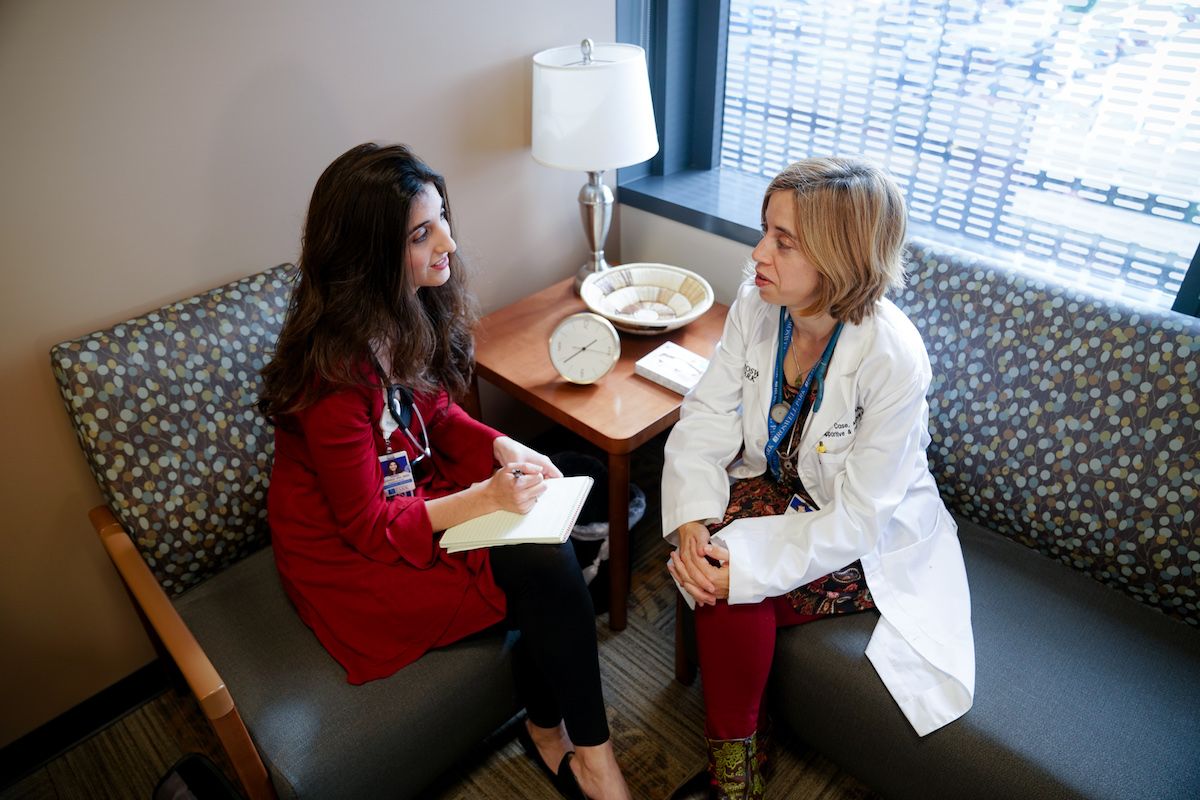If you have cancer, you may be experiencing anxiety, sleeplessness, pain or nausea as you go through treatment and recovery. You may also be overwhelmed by paperwork, medications, medical appointments and housework.
Anna Bernas, BSN, RN, is here to help. As the Home Connections Clinical Liaison to Roswell Park, it’s her job to introduce patients and their caregivers to the in-home palliative care services provided by her organization. While Roswell Park offers a full menu of palliative care services for both inpatients and outpatients, Home Connections extends that support for those who may need more assistance at home.
Anna makes one thing perfectly clear: Palliative care is not the same as hospice care. Bernas says some patients express concern that Home Connections is a program of Hospice Buffalo. “They ask, ‘Is it pre-hospice? Does this mean I’m terminally ill and have to give up treatment? What does the doctor know that I don’t know?’”
Unlike hospice, Home Connections and Roswell Park's Palliative Care program are for anyone with a serious, progressive illness — at any stage of the illness, even if the patient is undergoing treatment to cure the disease. Its mission is to improve quality of life for the patient, caregiver and family by managing the physical and emotional side effects of the disease and treatment.
"Do I Need Home Palliative Care?"
When Bernas first meets with patients in the clinic, they often ask her, “Do I need home palliative care? I’m already seeing the Palliative Care team here at Roswell.” She tells them, “Currently the Roswell Park Palliative Care team does not come to see you in your home. They treat you in the hospital and clinic, but they’re not seeing your living situation at home, your transportation and financial issues. They don’t know if you’re taking your meds correctly. In between visits, it’s hard to see what’s going on. We provide extra eyes and ears in the home. Roswell Park's Palliative Care team works together with Home Connections.
“When you’re an inpatient in the hospital, you’ve got a social worker visiting you every day, a discharge planner, a case manager. At home, some patients don’t have the kind of support they need. It becomes overwhelming, trying to navigate it all, and that hurts their quality of life.”
A Team for Every Patient
Every patient enrolled in Home Connections has a team that includes a nurse practitioner and registered nurse, both with specialty training in palliative care; a medical social worker; and trained volunteers who can provide such services as grocery shopping, transportation, and companionship. (Volunteer services are based on availability.) A palliative care physician oversees the team.
Noting that some patients may go months between doctor’s appointments, Bernas says continual monitoring at home by the Home Connections team “can prevent patients from hitting a crisis and ending up in the hospital, which could interrupt their chemotherapy or radiation treatments.” She adds that insurance plans are recognizing the value of covering services for home palliative care, because the services “reduce frequent hospitalizations and emergency room visits.”
The services provided depend on what the patient needs. Some people may see a nurse only once a month, while others need more frequent visits. “And there’s a 24-hour nurse line they can call at any time,” says Bernas. “For example, the patient might say, ‘I think I’m getting an infection.’ Then the nurse can call the patient’s primary physician and request antibiotics to prevent a serious infection and hospitalization.
“Home Connections can help the patient and family navigate through the healthcare system,” adds Bernas. “Patients see a lot of doctors here at Roswell, but also community doctors — maybe a cardiologist or pulmonologist. They’re getting labs and scans. One doctor’s prescribing this; another doctor’s prescribing that. They may need medical equipment or not know where to look for a home health aide.” The team’s social worker can also put the patient and family in touch with different kinds of community services, such as Meals on Wheels, assist in filling out health care proxy and MOLST forms, or help get an emergency medical assistant button.
Says Bernas, “It’s like having a healthcare professional in the family that you can call anytime to help with various things related to your medical care.”
Never miss another Cancer Talk blog!
Sign up to receive our monthly Cancer Talk e-newsletter.
Sign up!Frequently Asked Questions
Who is eligible for Home Connections?
Anyone who has a serious, progressive illness and has physical or emotional/psychological symptoms that need to be managed. Home Connections provides palliative care at any stage of illness.
Is Home Connections the same as hospice care?
No. Although the services are provided by Hospice Buffalo, Home Connections is not an end-of-life program. Patients who enroll may be in active treatment with the goal of a cure.
What services does Home Connections provide?
- Help in managing pain, disease symptoms and treatment side effects, to improve quality of life for patients, their caregivers and loved ones
- On-call nursing support, 24 hours a day
- Coordination of care — for example, between different healthcare providers and community agencies
- Help with a range of issues, including advanced care planning, transportation needs, companionship and respite for caregivers
Does insurance cover the services?
Most major health plans cover the services in full. Home Connections will check your insurance plan at the time of referral to find out whether you’re covered.
Bernas notes that home palliative care programs are not available in every county of New York State, and different counties have different names for their programs. For example, Home Connections serves Erie County; Pathways serves Niagara County.
Want to know more? If you live in Erie County, check out Home Connections online, call 716-989-2475, or visit Roswell Park’s Resource Center for Patients & Families to pick up an information packet.


